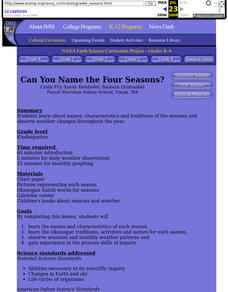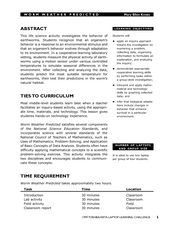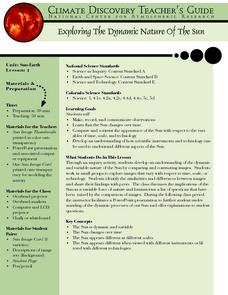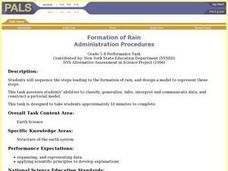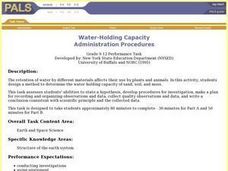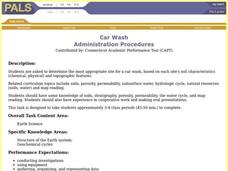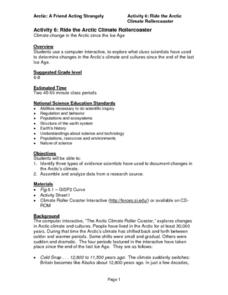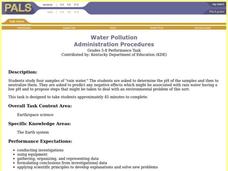Curated OER
Can You Name the Four Seasons?
Students explore names, characteristics and traditions of the seasons and observe weather changes throughout the year.
Curated OER
Carbon Dioxide Heats It Up
Young scholars design an investigation to test whether vegetation in an area helps regulate the ambient air temperature. They make comparisons between the investigation and global changes in climate. In groups, they present their...
Curated OER
Photosynthesis and Biomass Growth
Sixth graders examine renewable energy sources such as ethanol. In this photosynthesis and biomes lesson students complete a project on farming techniques.
Curated OER
"Hard" Data from Space
Students use satellite images to analyze development patterns within Baltimore City. They prepare a land cover map for Baltimore indicating the prevalence of impervious surfaces and explore how these patterns affect water pollution.
Curated OER
Worm Weather Predicted
Students examine worm habitats. In this animal habitats lesson, students participate in a lab activity that requires them to explore the adaptations that earthworms make to their environment.
Curated OER
Save the Bay!
Students explore environmental protection by creating a presentation in class. In this Chesapeake Bay lesson, students discuss the current threats from human beings towards the delicate balance of life near the bay. Students identify the...
Curated OER
The Ups and Downs of Weight and Mass
Students explore the concept of mass, and how it differs from weight. They also calculate their weight change as they ride up and down on an elevator. They record the changes in their weight as the elevator moves
graph the collected data.
Curated OER
Earthquake Epicenters and Magnitudes
Students work on a virtual earthquake to increase their understanding of seismograms, earthquake epicenters, Richter Magnitude and triangulation when finding the epicenter of an earthquake.
Curated OER
Exploring the Dynamic Nature of the Sun
Students compare and contrast images of the sun taken at different times and viewed at different scales. They record their observations in a journal and create a graphic organizer to help analyze their observations.
Curated OER
Formation of Rain
Students sequence the steps leading to the formation of rain, and design a model to represent these steps. This task assesses students' abilities to classify, generalize, infer, interpret and communicate data, and construct a pictorial...
Curated OER
Water-Holding Capacity
Students design and conduct an experiment to compare the water-holding capacity of sand, soil, and moss. They measure the change in weight for each material after adding the same amount of water to each material.
Curated OER
Car Wash
Learners determine the most appropriate site for a car wash, based on each site's soil characteristics (chemical, physical) and topographic features. They perform an experiment to determine the changes to three different soil types when...
Curated OER
Ride the Arctic Climate Rollercoaster
Students view interactive CD-ROM entitled The Arctic Climate Roller Coaster, research evidence of changes in climate through the years, record ways people responded to changes, and create short presentations to share evidence with...
Curated OER
Creeping
Young scholars observe, measure, and graph a model of slow down slope movement representing soil creep. This task assesses students' abilities to collect, record, and organize data, set up graph axes, plot data points, draw line graphs,...
Curated OER
Pattern
Students describe examples of the relationship between structure and function in living systems, particularly with regard to specialized tissues and organs. They describe examples of biological diversity and adaptation of organisms with...
Curated OER
Rain, Rain, Go Away
Students conduct a number of experiments involving evaporation and condensation. They view and discuss a video about the water cycle and then design posters about the rain based on the book "Cloudy With A Chance of Meatballs".
Curated OER
Peat Pots
Students place a peat pot in water to observe and calculate the rate of capillarity in a model of a soil. This task assesses students' abilities to make simple observations, collect, record, and represent data, use a data table to...
Curated OER
Water Pollution
Students study four samples of "rain water". They asked to determine the pH of the samples and then to neutralize them. Students are asked to predict any negative effects which might be associated with water having a low pH and to...
Curated OER
Air and Water in the Environment
Second graders participate in a three part lesson in which they identify and describe forms of moisture in the environment. Part one of the lesson involves the three stages of the water cycle, part two focuses on creating humidity by...
Curated OER
ANIMALS OF ANTARCTICA
Students are introduced to the animals of Antarctica and how they adapt to their environment and the changes of the seasons after being read the story,"Counting Penguins" . They pick an animal and predict how he/she thinks this animal...
Curated OER
Rock Discovery
Fourth graders identify rocks in this discovery lesson by examining rock characteristics and processes. They identify basic properties of minerals and rocks. They revise their theories of the natural world, once they see and learn new...
Curated OER
Chemical Weathering
Students measure the effect of water temperature on the rate of a chemical reaction, similar to the interaction of a weak acid and carbonate rock, using hot water and effervescent antacid tablets.
Curated OER
Formation of Wind
Young scholars correctly sequence the steps leading to the formation of wind, and describe the cause and effect relationships involved in the formation of wind. This task assesses students' abilities to classify, generalize, infer,...
Curated OER
Weathering and Erosion: Some Ways the Hydrosphere Affects the Geosphere
Students explain the causes of erosion, describe the effects of erosion, and devise a method of preventing erosion. They model the before-and-after-effects of erosion.
Other popular searches
- Earth Science Inquiry
- Earth Science Inquiry Rocks
- Earth Science Inquiry Water
- Earth Science Inquiry Maps
- Earth Science Inquiry Soil


